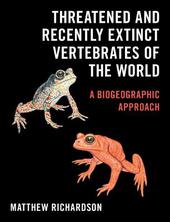
|
Threatened and Recently Extinct Vertebrates of the World: A Biogeographic Approach
Hardback
Main Details
| Title |
Threatened and Recently Extinct Vertebrates of the World: A Biogeographic Approach
|
| Authors and Contributors |
By (author) Matthew Richardson
|
| Physical Properties |
|
| Category/Genre | Zoology - Vertebrates
Management of land and natural resources |
|---|
| ISBN/Barcode |
9781108495868
|
| Classifications | Dewey:599 |
|---|
| Audience | |
|---|
| Illustrations |
Worked examples or Exercises
|
|
Publishing Details |
| Publisher |
Cambridge University Press
|
| Imprint |
Cambridge University Press
|
| NZ Release Date |
31 May 2023 |
| Publication Country |
United Kingdom
|
Description
Habitat loss and degradation are currently the main anthropogenic causes of species extinctions. The root cause is human overpopulation. This unique volume provides, for the very first time, a comprehensive overview of all threatened and recently extinct mammals, birds, reptiles, amphibians, and fishes within the context of their locations and habitats. The approach takes a systematic examination of each biogeographic realm and region of the world, both terrestrial and marine, but with a particular emphasis on geographic features such as mountains, islands, and coral reefs. It reveals patterns useful in biodiversity conservation, helps to put it all into perspective, and ultimately serves as both a baseline from which to compare subsequent developments as well as a standardization of the way threatened species are studied.
Author Biography
Matthew Richardson is a Canadian author known for such award-winning books as Lemurs of Madagascar (3rd edition, Conservation International, 2010). He has worked alongside some of the most high-profile conservationists in the world, and served as an active member of both the IUCN/SSC Primate Specialist Group and Conservation Planning Specialist Group. Passionate about both human and natural history, he has drawn extensively from these experiences to create what will surely become the foundational text on endangered and extinct species for decades to come.
|